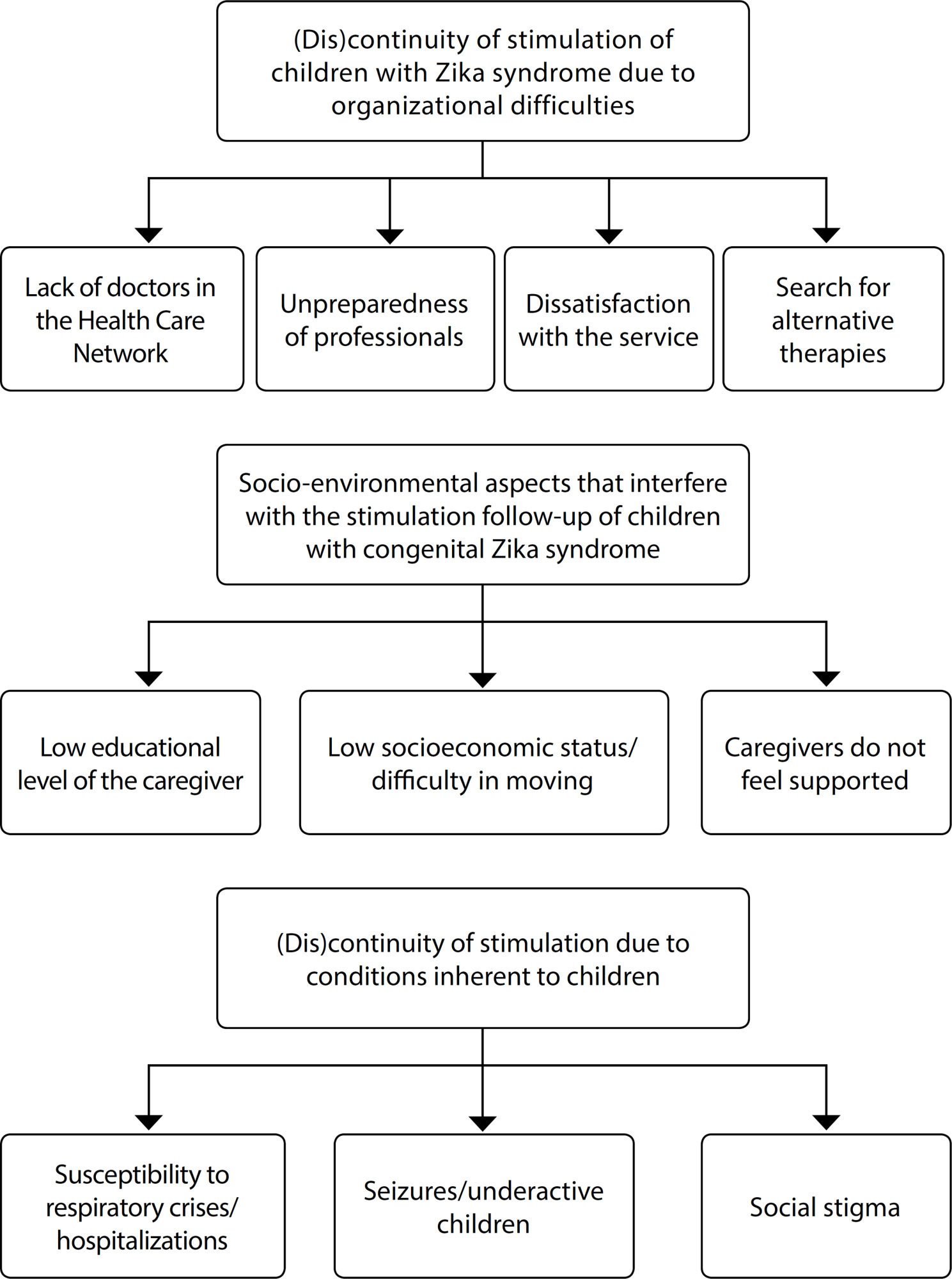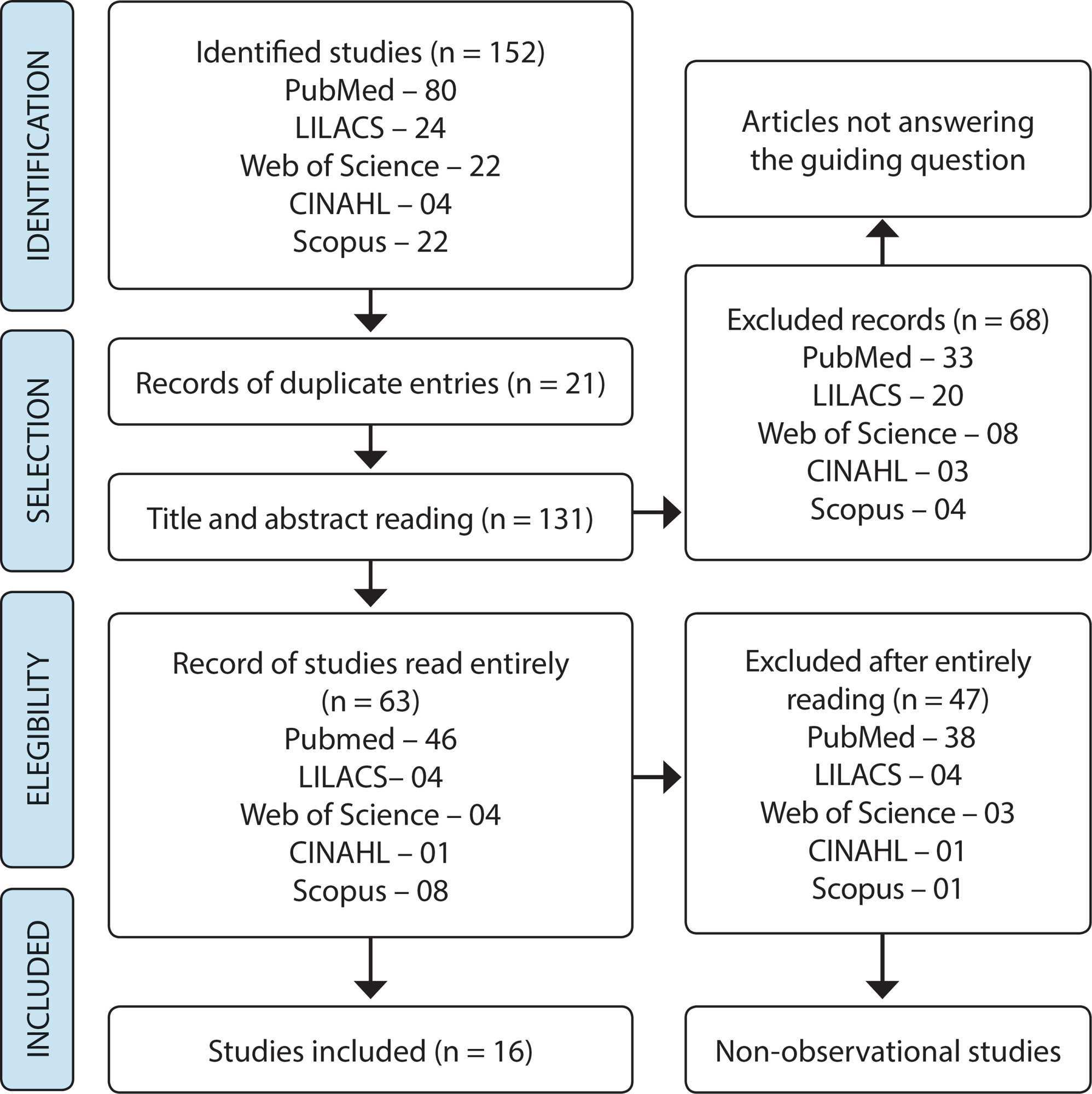-
ORIGINAL ARTICLE
Congenital Zika Virus Syndrome: care in light of the Brazilian Unified Health System principles
Revista Brasileira de Enfermagem. 2022;75(2):e20210146
10-01-2022
Resumo
ORIGINAL ARTICLECongenital Zika Virus Syndrome: care in light of the Brazilian Unified Health System principles
Revista Brasileira de Enfermagem. 2022;75(2):e20210146
10-01-2022DOI 10.1590/0034-7167-2021-0146
Visualizações0Ver maisABSTRACT
Objective:
to know health professionals’ perceptions about care actions provided to children with Congenital Zika Virus Syndrome and their families.
Methods:
this is a qualitative study, carried out in a capital of center-western Brazil, based on the Unified Health System theoretical precepts. Data were collected in September and October 2020, through audio-recorded interviews with 12 health professionals from a specialized service and submitted to analysis of content, thematic modality.
Results:
the implementation of care actions with these children occurs through multidimensional assessment of children and their families, use of the Unique Therapeutic Project, therapeutic interventions for the development of children and the communication and exchange of interprofessional and family experiences, in addition to considering professionals’ prior knowledge and their search for it.
Final considerations:
children with CZS and their families need individualized, frequent, integrated and continuous care.
-
ORIGINAL ARTICLE
Continuity of neuro-psychomotor stimulation of children with congenital Zika syndrome
Revista Brasileira de Enfermagem. 2021;74(6):e20200694
06-14-2021
Resumo
ORIGINAL ARTICLEContinuity of neuro-psychomotor stimulation of children with congenital Zika syndrome
Revista Brasileira de Enfermagem. 2021;74(6):e20200694
06-14-2021DOI 10.1590/0034-7167-2020-0694
Visualizações0ABSTRACT
Objective:
Understand the continuity of stimulation of neuro-psychomotor development in children with congenital Zika syndrome.
Method:
Descriptive-exploratory study with theoretical support in symbolic interactionism. Between August and November 2019, 12 health professionals were interviewed in depth; and to the focus group, seven caregivers of children with the syndrome. The analysis was thematic inductive.
Results:
The continuation of neuro-psychomotor stimulation of children with Zika syndrome goes through: organizational difficulties (lack of doctors, professional unpreparedness, dissatisfaction and search for other services); socioenvironmental aspects (low maternal education, low socioeconomic level, difficulty in moving and lack of support); and conditions inherent to children (hospitalizations for respiratory crises, seizures, hypoactivity and social stigma).
Final considerations:
A strengthened support network with qualified human resources is necessary in order to provide comprehensive care and avoid the discontinuity of neuro-psychomotor stimulation of children with congenital Zika syndrome.
Palavras-chave: Child CareChild DevelopmentContinuity of Patient CareSymbolic InteractionismZika VirusVer mais
-
ORIGINAL ARTICLE
Family fortresses in Zika Congenital Syndrome according to Betty Neuman
Revista Brasileira de Enfermagem. 2020;73(2):e20180578
02-17-2020
Resumo
ORIGINAL ARTICLEFamily fortresses in Zika Congenital Syndrome according to Betty Neuman
Revista Brasileira de Enfermagem. 2020;73(2):e20180578
02-17-2020DOI 10.1590/0034-7167-2018-0578
Visualizações0Ver maisABSTRACT
Objectives:
to identify elements that contribute to strengthen the family system of children with Zika virus congenital syndrome according to Betty Neuman’s theory.
Methods:
qualitative research, carried out in the outpatient service of a public hospital in the city of Recife, Brazil, with 13 mothers, by semi-structured interviews. The IRAMUTEQ software was used for data analysis and the interpretation was carried out according to Betty Neuman’s Systems Model Theory.
Results:
the dendrogram originated five categories, which we named: Family Routine, Health Service Assistance, Changes in Lifestyle, Support Network, and Social Repercussions of Care for the the Family Context.
Final considerations:
nursing actions based on Betty Neuman’s theory provide subsidies for the recognition of elements that strengthen the defense lines of the family system. These resources can be explored, aiming to maintaining the well-being and balance in the context of the family system.
-
ORIGINAL ARTICLE
Early stimulation in the development of children with microcephaly: maternal perception
Revista Brasileira de Enfermagem. 2019;72(suppl 3):139-146
12-13-2019
Resumo
ORIGINAL ARTICLEEarly stimulation in the development of children with microcephaly: maternal perception
Revista Brasileira de Enfermagem. 2019;72(suppl 3):139-146
12-13-2019DOI 10.1590/0034-7167-2018-0272
Visualizações0Ver maisABSTRACT
Objective:
To know the maternal perception about early stimulation and its repercussion in the development of the child with microcephaly associated with zika virus.
Method:
A qualitative study was carried out from June to August 2017 with five mothers of children diagnosed with microcephaly associated with zika virus. The data were collected through individual interviews with semi-structured script and evaluated by the content analysis, in its thematic modality.
Results:
Mothers recognized the benefits and the advances in the development of the child after the beginning of the early stimulation. It is noteworthy that the difficulty of transportation was the main reason for the lack of attendance at consultations, and that the short time of stimulation was the main weakness of the service.
Final considerations:
The recognition of maternal perception and the difficulties and weaknesses of the service can contribute to the elaboration of public policies and the planning of holistic care for children with microcephaly and their families.




